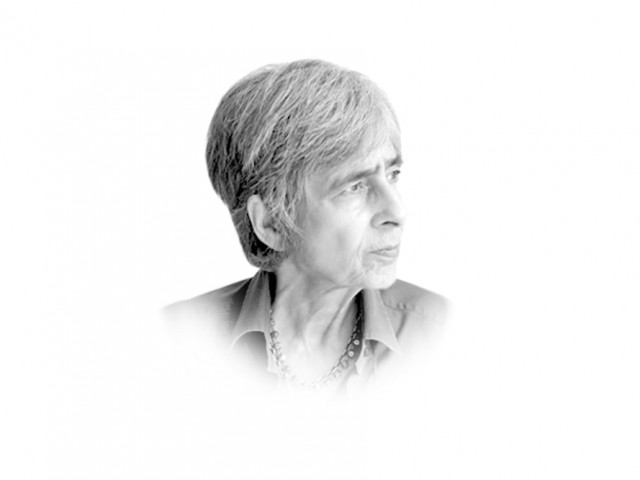Made in Pakistan
We now await to find out which adjective will be applied to his third ‘downfall’

amina.jilani@tribune.com.pk
We have had transition after sickening transition, and here we are, in a glorified mess. Admittedly, the rusty wheels keep turning at a snail-like pace, things seem to work automatically despite an absence of any forward moving political activity and a bureaucracy subservient to mediocrity, if not downright rot and corruption, in thrall to their deadly political masters rather than to the state and its people. The grandiose theory about elections weeding out the undesirable and throwing up the new, the able and the honest has been a flop. Each transition has produced something that has proven to be worse than anything that has gone before — and heaven knows that was all bad enough. And to blame is the so-called ‘system’ that is followed willy-nilly despite the fact that it is acknowledged that for a multitude of reasons it is deeply, perhaps irredeemably, flawed.
This third-time prime minister is an unmitigated disaster, who runs the ‘system’ in a huddle in places like Raiwind and Murree with his relatives and a couple of loyal chums, all of whom have bolt holes to run to if the ‘system’ should one day just collapse. One man who has stuck with him through thick and thin, not quite understandable, and who now seems not to be one of the close inner circle (happily for him) is his now adviser on national security and foreign affairs, the gentlemanly Sartaj Aziz (surely old enough to know better) who in his book Between Dreams and Realities, published in 2009, had rather telling comments to make on our supposed primus inter pares: “As a human being, Nawaz Sharif is a complex personality. He has no doubt some outstanding qualities as a political leader ... But like all populist leaders he has his weaknesses and shortcomings. He is very impulsive by nature and therefore thrives on dramatic moves rather than well-considered decisions. He has a strong belief … in the importance of his personal power. He therefore ran the government on his terms through a system of personalised decision-making, without adequate consultations or participation of his cabinet colleagues, the parliament or other relevant bodies … This desire to strengthen his personal power base rather than strengthen the institutions that are the main pillars of a viable democratic process, eventually led to his dramatic downfall.”
And this is what, in its finite wisdom, the bludgeoned electorate of 2013 brought in once again. We now await to find out which adjective will be applied to his third ‘downfall’. The Mian has fluffed up once again, expected by the sane, and his personal power stands somewhat eroded by an army chief who, thanks to him, is the most popular man of the great republic both internally and externally.
The latest offering on the political autobiography front comes from friend Chandi, politician to the bone, Syeda Abida Hussain, in her book so aptly titled Power Failure. It is a frank and honest account of the murk and mire of Pakistan’s political playground, and how sliding seamlessly from political party to political party is decided on the basis of practicalities. If one is at all squeamish, not wishing to acknowledge reality (the famous ‘state of denial’), it could be somewhat horrifying, but then one would have to be a true ignoramus, knowing that it is all coming, so to speak, from the horse’s mouth. Apart from the politics, it is an interesting read, anecdotally, and to her great credit she has, what few in the hardcore republic have, a sense of humour, even when it comes to herself.
Published in The Express Tribune, January 31st, 2015.
Like Opinion & Editorial on Facebook, follow @ETOpEd on Twitter to receive all updates on all our daily pieces.















COMMENTS
Comments are moderated and generally will be posted if they are on-topic and not abusive.
For more information, please see our Comments FAQ